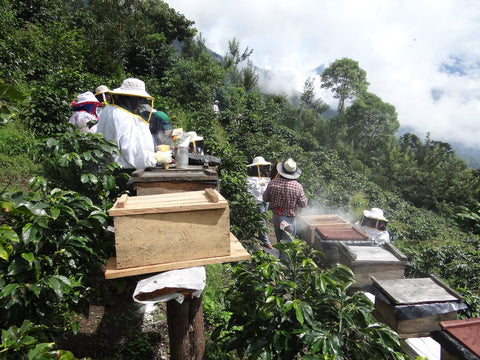Coffee production faces challenges all over the world. In Colombia - the third largest coffee growing country in the world - things are no different. Due to the average age of producers being 60 and rising, it could compromise the future of the country’s coffee industry.
Why do young people not want to grow coffee?
Earning a living as a coffee farmer family is no easy job. To be prosperous, growers need to balance raising a family at the same time as cultivating coffee and investing any extra funds back into their farms. When faced with a few consequent years of low and volatile coffee prices, often times the focus shifts away from the long-term financial security. Thinking far ahead is simply not an option when farmers are struggling to meet their short-term goals and cover for the basic necessities.

Most coffee farmers we work with have over 30 years of experience in planting, harvesting, and processing coffee. It truly is a lifelong commitment - 365 days a year spent in the plantation working under the harsh sun, through the rain and the wind. The job of a farmer is exhausting – climbing the steep hills, surrounded by snakes and covered in mosquito bites is a norm of the everyday life.
And when walking those steep hills becomes a challenge, retirement often is not an option. In most countries self-employed farmers do not have social security systems to fall back on to. So, they have no other option but to keep working on their plantations.
At the same time, many young farmers do not want to continue their family farming legacy. The belief is that there is more lucrative and less labour-intensive work to be found in the city. City jobs are seen to be more secure and better paid. Due to these reasons, the young generation most often prefers white collar jobs as opposed to farming.

Traditionally, coffee prices are low and production faces challenges due to the climate change. The coffee industry is a high investment and low return activity. Simply put – it is hard work, with low remuneration.
Yet, white-collar jobs are in high demand and their limited availability makes it impossible to supply enough of positions for everyone. Moreover, rural-urban migrants put a lot of socio-economic pressure on the already crowded big cities of developing countries. If opportunities for success were as great in rural areas as they are in the cities, young people wouldn’t be so eager to leave their farms.
And of course, we want the world to keep enjoying coffee for decades to come! Probably you, as well as us, are not ready to give up your morning cup and your brewing routines. That is why it is essential that the young generation sees future in coffee farming and take the reins of its production. Though for this to happen, a change has to be made and solutions found to the issues farmers are facing.
What can we do?
Firstly, we obviously do not want to exacerbate the problem. That is why we pay farmers a fair price and engage in long-term relations. We strongly believe that growing coffee deserves financial recognition and no farmer should be forced into selling their product below what they invest in the production.

But we cannot make the change alone. This is why raising awareness (including writing this blog) is another important action we take. When Asprotimana asked us to support their youth group by purchasing their coffee and bringing it to the UK, we immediately though it was a great idea. We were even more convinced once we cupped the coffee! And this is how you, as a customer can help to make change by enjoying high quality coffee.
By Pascale Schuit - Sustainable Sourcing Manager


